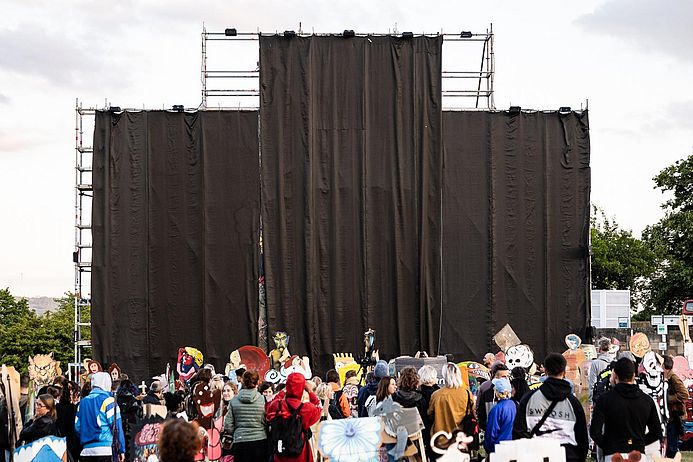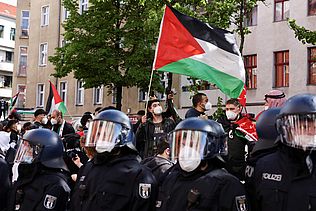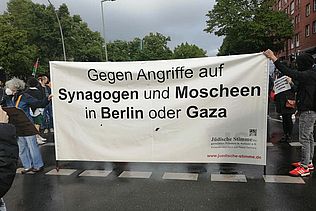documenta fifteen wanted to turn everything over to art collectives of the Global South. The Indonesian artists' collective ruangrupa was chosen as curators, with ruangrupa in turn commissioning other artists' collectives to seek out yet other ones, thereby democratising the process of selecting works. As little hierarchy as possible was the banner slogan. The idea was to create spaces for aesthetic experience, appropriation and doing-it-yourself with a conceptual world all their own, which could bring bourgeois visitors to documenta into contact or confrontation with other option for life and living together. A world replete with disasters threatening to make the South uninhabitable was supposed to be re-imaged with artistic practices that are not geared to the art market.
And now this: the accusation of anti-Semitism has been beleaguering the documenta makers for several weeks. This was levelled at the documenta makers, among other things, because of participation by the Palestinian artists' collective "Question of Funding", triggering physical attacks on the group's works by right-wing extremists and others. What was not discernible there has now actually been revealed in the cut-out of a painting by the Indonesian group Taring Padi: unambiguously anti-Semitic stereotypes. This appeared to be the nail on the coffin showing that the accusation of anti-Semitism had been justified right from the beginning and that warnings about an anti-Semitic documenta had gone completely unheeded.
An impressive media attack
What happened in the course of the wrapping and subsequent removal of the image constitutes an imposing media attack on efforts in the public debate in Germany to expand the culture of remembrance to include reflection on colonial crimes without playing down the responsibility for Nazi crimes that has been laboriously established in the face of resistance from elites over a period of decades. "Die Welt" compares documenta with Goebbels propaganda, while "taz" attests to this post-colonialism's "Waterloo". So it's no longer about being objective and accurate. No, now it's all about throwing everything into one pot, stirring it well and then demonising the voices not only of Palestinians, but of the entire global South. Instead of reaching out for dialogue, talking to each other, learning to understand the different contexts and convincing each other, the Springer press and all those who have loathed the debate of recent years are seizing the opportunity to push the dagger in deep. In a repressive intellectual climate, actors who for years have been committed to dialogue and learning processes that avoid and oppose simplifications and tolerate ambivalences are in danger of being driven into isolation. It is to be feared that the political interests behind it all are being driven by desires for German renationalisation and German culturalisation. We are witnessing an attack on a multi-ethnic Germany and its multi-perspective spaces of memory. The blanket indictment of anti-Semitism threatens to collapse these spaces and herd everyone into a nationalised politics of memory.
It is astonishing how unwittingly documenta, perhaps the last of its kind, and its makers have contributed to this. To what extent this relates to their concept of art and culture and their adoration of the collective, as conjectured by the art critic Bazon Brock, who defends the responsibility and solitude of the artist as an achievement of modernity, is still to be revealed. The good thing about the debate is that documenta can now be regarded from a critical angle without "exoticising" the global South or engaging in a postcolonial sacralisation of these questions. This is a necessary debate. If it is not only carried out in a paternalistic rear-guard action, it can become a healthy debate.
Resentment in its proper context
And yet, tremendous damage has been wrought. Damage to a shared global responsibility. Not for the first time in its history - the last documenta five years ago also featured a clandestine agenda - the event wanted to provide an impetus for a globalisation of perspectives, art practices and art itself by addressing the memory of colonial and neo-colonial crimes in many works of art. To what extent art has in this case been put under the yoke of a political itinerary is a question that may, and indeed must, be asked. If it were a debate taking place in a less toxic space, it could be productive. The banner that has now been cleared away, the cause of the scandal, is in fact not only a matter of anti-Semitism. The Taring Padi collective is addressing here one of the most bloodthirsty dictatorships of the post-war era, which was propped up by the USA, but also by Germany and Israel. The banner, which is already 20 years old, explores the question as to the extent to which the dictatorship continues to have an impact in a new guise. This is a fascinating question that is being discussed in agitprop style and is fraught with left-wing as well as anti-Semitic clichés. Debating about it all and putting aside good-evil platitudes would have been worthwhile.
This debate could also have settled on how anti-Semitic stereotypes outside the pale of a sensitised German public are taken for granted: The banner has been displayed at art shows all over the world in recent years. The documenta makers also closed rooms and shied away from debates. They could have sharpened awareness of this. But iconography laden with resentment can be found in many an art production intended to stand as an accusation of the political realm. To regard this in its proper context, I would have liked to look at Taring Padi's work. The aim is not to trivialise anti-Semitism: but "genocidal anti-Semitism" has been and still remains a uniquely German specialty. This is precisely what is being qualified and placed in a different geographical light when the accusation of anti-Semitism is framed in this way here.
Frank-Walter Steinmeier's opening speech was an indication that the process of decolonisation of Western attitudes of superiority has also had some sand thrown into its gears. His remarks on Israel's right to exist, rejection of which he declared to constitute a transgression of the limits of freedom of expression, are controversial. As so often in the German debate, he elevated his view of this limit to the general norm. In doing so, he not only stripped Palestinians of the legitimate right to reject a state that defines itself as Jewish, in which they are second-class citizens. He also consigned thoughts and ideas such as those of the Jewish-Israeli thinker Omri Boehm, who demands a completely new constitution for the state with equal rights for all citizens, to his notion of the "limits to freedom of opinion".
But even more striking is what Steinmeier chose not to say. An exhibition at the German Historical Museum in Berlin has very recently revealed how documenta was founded with the weighty participation of art historians who were implicated in National Socialism. If he had ventured any self-critical reference to this, documenta would not have been enshrined as the immaculate locus of world art and his speech would not have become a pretentious lecture to the artists of the South. In the same breath, he could have singled out Kassel as a centre of Nazi terror to underscore that anti-Semitism and dangerous right-wing extremism are not a cut-and-dried topic in the German context, either. As it were, however, documenta remains, as Hito Steyerl commented in the newspaper die ZEIT a few weeks ago, a centre of German whitewashing.
It goes on and on, above and beyond documenta
The participation of Palestinian artists alone was enough to prompt accusations of anti-Semitism and to delegitimise Palestinian voices in a disgraceful way. Another event organised by the Goethe Institute, from which the Palestinian writer Mohammed El-Kurd was disinvited on the grounds that he did not show enough respect for Israel, is at the centre of the controversy. Here, too, the accusation utilising the unfortunately now commonplace Nazi comparison struck a chord that was seeking to make itself heard due to the human rights violations that had been suffered. British-Pakistani writer and New York Times columnist Mohammed Hanif subsequently withdrew his participation. And he was not alone. The intellectuals of the South bowed out of the conversation, leaving the German debate to the Germans.
As an opportunity for a form of global art going beyond the market, documenta has thus been squandered by many sides. The whole debate leaves behind an uneasy feeling of misconduct, something like a sideshow that puts on the airs of being the main thing. Perhaps we want to use the grandiose spectacle of the documenta controversy as blinders to the realisation that the citizens of the West, with all their morality, enlightenment and goodwill, have no answer to the challenge of a world on the brink. Is this perhaps the real scandal?



